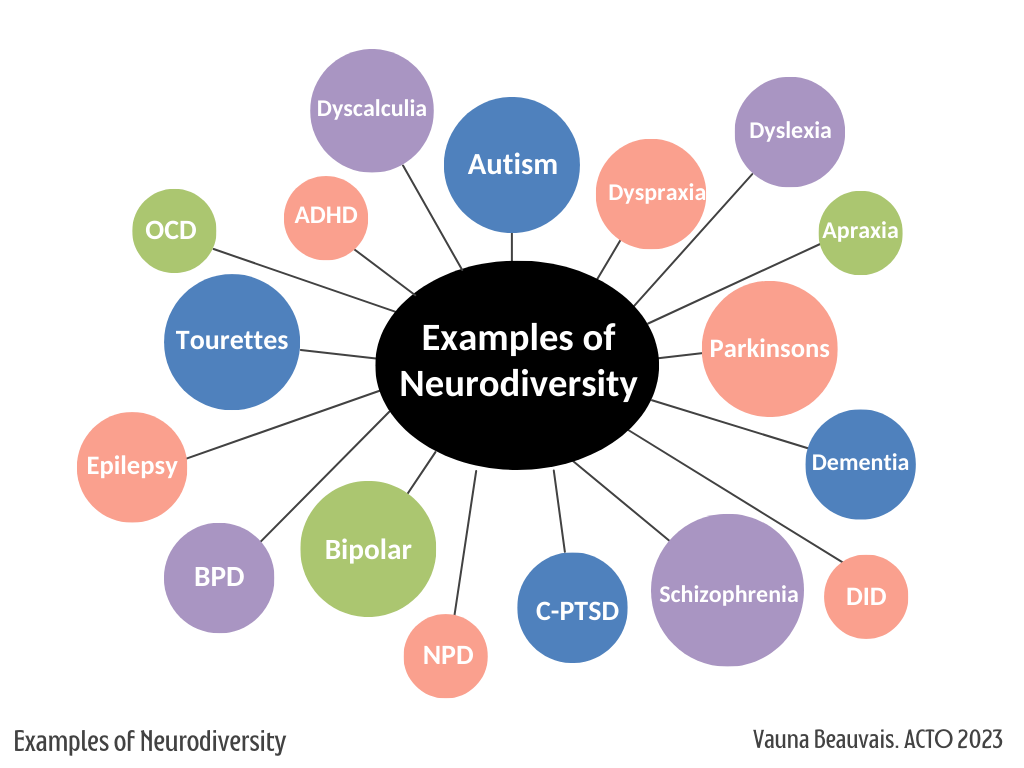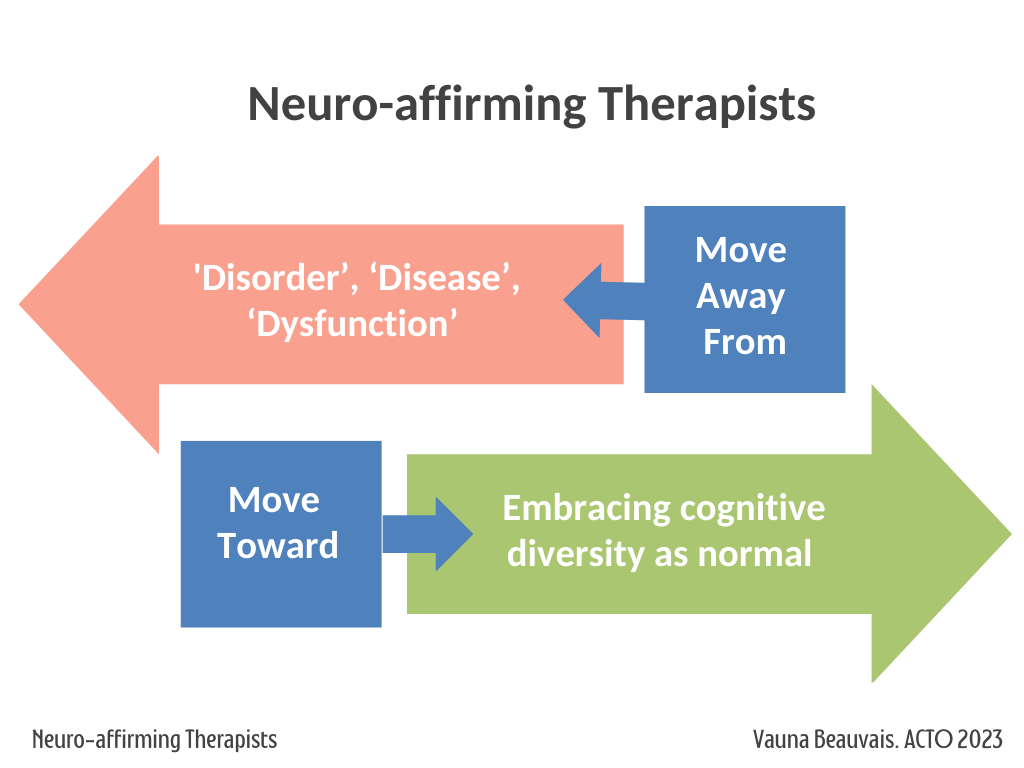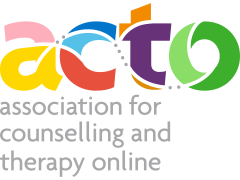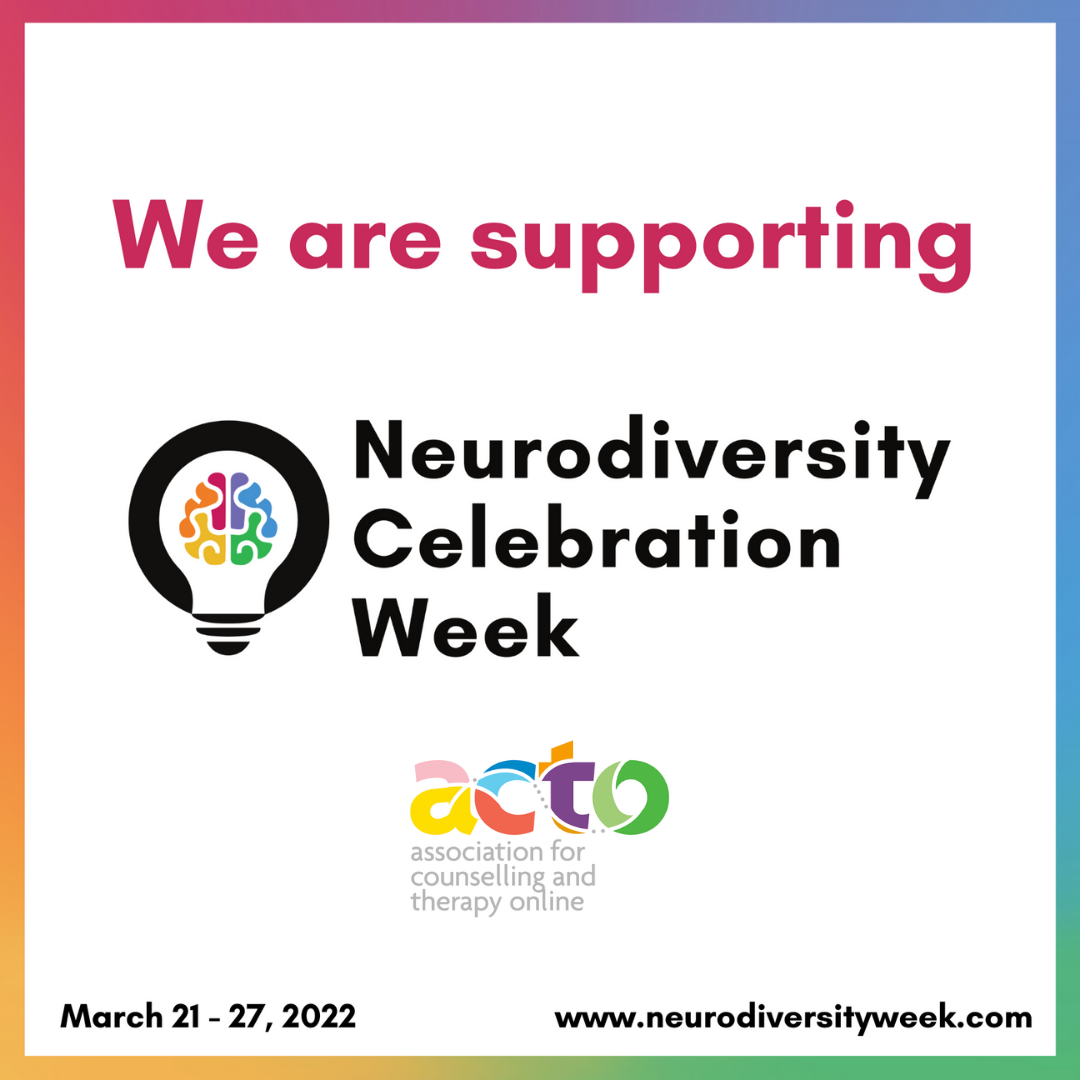Blog post for ACTO during neurodiversity week -13th to 19th of March 2023
The Neuro-Affirming Therapist
What is neurodiversity?
Neurodiversity is a natural and valuable form of human diversity (Walker, 2021). The neurodiversity paradigm is a way of thinking that asserts that among human beings there is a natural variation of minds, and it states that there is a type of mind that is typical, the dominant neurotype, along with populations of neurominorities. This mindset shift offers a framework for understanding and accepting difference, with a special emphasis on comprehending ability and disability differently from the traditional view of those concepts. All variations of cognitive style are valued equally, and strengths and benefits are accounted for, while simultaneously holding in mind the (sometimes, or often, disabling) impact on those people, of a society set up for the dominant neurotype.
For individuals aligned with the neurodversity movement, neurodivergence is core to a persons identity as a human being. Neurodivergent people have found each other in places on the internet, such social media groups and forums. There are benefits of being part of a wider collective, such as meeting other people like you, to hear stories similar to your own, and to share ways to feel encouraged about what life has to offer as a neurodivergent person. Bonding, discussing, or even just reading such things is validating and can alleviate a sense of isolation and hopelessness.
Who is neurodivergent?
Under the umbrella of the term ‘neurodiversity’ are people that identify with one or more of many conditions: Autism, ADHD, BPD, epilepsy, bipolar, OCD, C-PTSD, Dyslexia, DID, Tourettes, Schizophrenia, NPD, other developmental conditions, and acquired neurodiversity such as dementia and Parkinsons.

As psychotherapists and counsellors we can work therapeutically with clients in these populations by moving away from thinking in terms of ‘disorder’, ‘disease’, and ‘dysfunction’ being problematic and needing remediation or facilitating into ‘normal functioning’. And instead, move toward an attitude of embracing cognitive diversity as normal and opening up to thriving and wellbing being defined by the neurodivergent client.
In our therapy rooms, neurodovergent people are deserving of respect and accommodation. They do want to be understood for who and what they are, rather than being defined by what they have had a lifetime of being told they are not. Understanding the neurodivergent clients concept of a fulfilling life may lead to defining the outcomes of therapy, rather than what the therapist may think that the client should achieve. Damien Milton and Lyte Moon wrote a paper entitled ‘The Normalisation Agenda’ which explain that ‘normal’ had become equated with ‘healthy’ and that there was an unconscious professional bias toward seeking to normalise any atypical people for the good of society and for the good oth themselves (Milton, Moon, 2012). Chapman and Bovell (2022) assert that ethical interventions focus on the neurodivergent person flourishing, rather than on normalisation.

Neurodivergent-Affirming therapy
Along with resisting normalising clients (seeking to hide or ‘fix’ a perceived deficit), psychotherapists and counsellors can bear in mind the following three principles when working with neurodivergent clients.
- Recognise and value alternative forms of functioning and cultivate neurodivergent affirmation in therapeutic practice.
- This enables neurodivergent thriving and can counter neurotype dysphoria (Chapman, R. 2020)
- Facilitate a positive neurodivergent identity with clients
- Cooper et al stated that ihaing a positive autistic identity protects against mental health problems and encouraged therapists to help facilitate this with clients (Cooper, Smith and Russell, 2017)
- Consider confronting clients internalised stigma, when appropriate
- Bortha and frost have written about internalised stigma being a predictor of higher psychological distress and poor mental health (Bortha and Frost, 2020).
Using the neurodiversity framewrok for understanding and accepting human minds that diverge from the norm, and unguardedly listening to neurodivergent clients conceptualisations and interpretations of social life and relationships, positions psychotherapists and counsellors to understand the issues presented by neurodivergent clients. Gaining perspective on why the neurodivergent client believes that they are in therapy and what they want out of having therapy is, in itself, a huge step toward being a neuroaffirming therapist. As is pursuing the possibly atypical conceptualisation of a fulfilling life.
References:
- Bortha M, Frost DM. Extending the Minority Stress Model to Understand Mental Health Problems Experienced by the Autistic Population> Society and Mental Health. 2020 10(1) 20-34.
- Chapman R, Bovell V. Neurodiversity, Advocacy, Anti-Therapy. In Matson JL, Sturmey P, editors. Handbook of Autism and Pervasive Developmental Disorder. Autism and Child Psychopathology Series. Cham: Springer; 2022.
- Chapman, R. Neurotype Dysphoria. [Internet] Psychology Today. 2020. Accessed 10.03.2023. https://www.psychologytoday.com/gb/blog/neurodiverse-age/202006/neurotype-dysphoria
- Cooper K, Smith LGE, Russell A. Social Identity, self esteem, and mental health in autism. Eur J Soc . Psychol. 2017 47(7) 844-54.
- Milton, Damian, Moon, Lyte (2012) The normalisation agenda and the psycho-emotional disablement of autistic people. Autonomy, the Critical Journal of Interdisciplinary Autism Studies, 1 (1). ISSN 2051-5189. (KAR id:62638)
- Walker, N. Neurodiversity: Some basic terms and definitions [internet] accessed 2023. https://neuroqueer.com/neurodiversity-terms-and-definitions/
- Walker, N.(2021) Neuroqueer Heresies. Autonomous Press
Author:
Vauna Beauvais.
MSc Psychotherapy, Certified Transactional Analyst, Certified Cybertherapist, PGCDip Counselling. UKCP registered Psychotherapist.
Vauna is a UKCP registered Psychotherapist specialising in working with neurodivergent adults. She has been seeing clients for over 20 years in private practice. She is also a clinical supervisor for counsellors and psychotherapists who are seeing neurodivergent clients and for therapists who are autistic themselves.Discovering at over 40 years old, that she is Autistic with ADHD herself, she turned her interest toward understanding the autistic experience and what that means for therapists, trainers, clinical supervisors, and for autistic clients.Areas of interest over the years have included performance and executive functioning and she has developed a neuroaffirming approach to coaching for people with ADHD or ADD.She is a qualified Coach and Trainer, a Certified Transactional Analyst, and a Certified Cybertherapist, and is currently serving on the board of directors for The Association for Counselling and Psychotherapy Online (ACTO)

